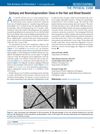1 citations,
January 2016 in “American Journal of Clinical and Experimental Medicine” Men with androgenic alopecia have different hair copper levels than those without.
 November 2023 in “Biology”
November 2023 in “Biology” Lower hair copper and copper-to-zinc ratio are linked to more severe coronary artery disease.
[object Object]  May 2024 in “Pakistan Journal of Health Sciences”
May 2024 in “Pakistan Journal of Health Sciences” Iron deficiency is linked to hair loss in CTE patients.
65 citations,
August 2016 in “Metabolic brain disease” Children with autism have lower levels of essential and toxic trace elements in their hair.

Penicillamine can cause taste problems due to copper loss, which can be fixed with copper or zinc supplements.
 January 2016 in “Springer eBooks”
January 2016 in “Springer eBooks” Understanding drug interactions, side effects, and patient-specific factors is crucial for effective dermatological care.
 February 2019 in “Trace elements and electrolytes”
February 2019 in “Trace elements and electrolytes” Women with chronic hair loss had lower levels of zinc, copper, and ferritin than healthy women.
 3 citations,
June 2019 in “Journal of Bangladesh Society of Physiologist”
3 citations,
June 2019 in “Journal of Bangladesh Society of Physiologist” People with hair loss often have lower levels of zinc and copper in their blood.
February 2021 in “INTERNATIONAL JOURNAL OF SCIENTIFIC RESEARCH” Low zinc and copper levels may indicate Telogen Effluvium.
 2 citations,
October 2018 in “The journal of pediatrics/The Journal of pediatrics”
2 citations,
October 2018 in “The journal of pediatrics/The Journal of pediatrics” The document concludes that specific hair and blood vessel abnormalities in infants with seizures and developmental issues may indicate Menkes disease, which lacks a cure and is often fatal by age 3.
 37 citations,
March 2014 in “Journal of Trace Elements in Medicine and Biology”
37 citations,
March 2014 in “Journal of Trace Elements in Medicine and Biology” Lower hair zinc and copper levels found in Turkish males with hair loss; higher BMI linked to less hair zinc.
 5 citations,
July 2017 in “Women & Health”
5 citations,
July 2017 in “Women & Health” Nursing women in the West Bank with higher income and non-smoking habits have higher blood zinc levels.
 73 citations,
January 2013 in “Annals of Dermatology”
73 citations,
January 2013 in “Annals of Dermatology” People with hair loss, especially those with certain types, have lower zinc levels, and zinc supplements might help.
 June 2024 in “Research Square (Research Square)”
June 2024 in “Research Square (Research Square)” Copper deficiency is linked to post-COVID-19 hair loss in women.
 1 citations,
November 2011 in “Dermatologica Sinica”
1 citations,
November 2011 in “Dermatologica Sinica” Women using hair relaxers with alopecia had lower zinc levels, suggesting zinc deficiency might contribute to hair loss.
 21 citations,
January 2014 in “Dermatology Research and Practice”
21 citations,
January 2014 in “Dermatology Research and Practice” Hair and serum levels of zinc, copper, and iron are similar in people with alopecia areata and healthy individuals.
 10 citations,
May 1986 in “Experientia”
10 citations,
May 1986 in “Experientia” Too much zinc in the diet can cause hair loss and color change in young mice by reducing copper in the body.
January 2022 in “Indian journal of paediatric dermatology” Children with early graying hair might have lower levels of certain nutrients like zinc, magnesium, and Vitamin B12.
 6 citations,
January 2018 in “PubMed”
6 citations,
January 2018 in “PubMed” Heavy metals might contribute to hair loss in Telogen Effluvium.
 63 citations,
May 2017 in “American Journal of Clinical Dermatology”
63 citations,
May 2017 in “American Journal of Clinical Dermatology” People with alopecia areata often have lower levels of vitamin D, zinc, and folate, but more research is needed to understand if supplements can help treat it.
 18 citations,
December 2010 in “Journal of Trace Elements in Medicine and Biology”
18 citations,
December 2010 in “Journal of Trace Elements in Medicine and Biology” Women with AGA have more androstenedione and dihydrotestosterone, less copper and zinc; copper imbalance affects AGA; treatment improves hormones and minerals.
 March 2024 in “International journal of molecular sciences”
March 2024 in “International journal of molecular sciences” Zinc, copper, and iron are important for skin health and may help diagnose skin diseases.
 73 citations,
May 1976 in “JAMA”
73 citations,
May 1976 in “JAMA” Long-term parenteral nutrition without zinc can cause severe zinc deficiency.
 1 citations,
June 2007 in “Almustansiriya journal of pharmaceutical sciences/Al-Mustansiriyah journal of pharmaceutical sciences”
1 citations,
June 2007 in “Almustansiriya journal of pharmaceutical sciences/Al-Mustansiriyah journal of pharmaceutical sciences” Antioxidants can help improve hair growth in people with alopecia areata.
[object Object]  24 citations,
June 2010 in “Clinics in Dermatology”
24 citations,
June 2010 in “Clinics in Dermatology” Taking too many vitamin and mineral supplements can cause serious health problems.
 13 citations,
December 2016 in “PubMed”
13 citations,
December 2016 in “PubMed” People with a common type of hair loss have higher stress levels in their body, and treatments that reduce this stress could help.
 5 citations,
May 2020 in “Diagnostics”
5 citations,
May 2020 in “Diagnostics” Lower zinc levels may predict less effective hair loss treatment.
 January 2024 in “Biological trace element research”
January 2024 in “Biological trace element research” Isotretinoin affects trace element levels and requires monitoring of liver and kidney functions.
 1 citations,
October 2023 in “The Journal of nutrition, health & aging”
1 citations,
October 2023 in “The Journal of nutrition, health & aging” Higher hair levels of zinc and chromium were linked to less cognitive decline in very old people.
 165 citations,
January 2008 in “Journal of biomaterials science. Polymer ed.”
165 citations,
January 2008 in “Journal of biomaterials science. Polymer ed.” The peptide GHK-Cu helps heal and remodel tissue, improves skin and hair health, and has potential for treating age-related inflammatory diseases.

























